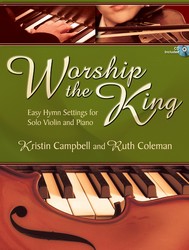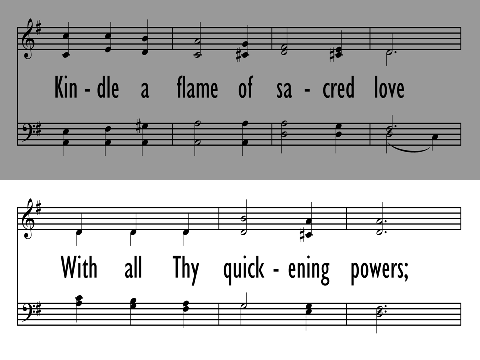- |
User Links
Come, Holy Spirit, Heavenly Dove

Come, Holy Spirit, heavenly Dove, With all Thy quickening powers
Author: Isaac Watts (1707)Published in 1215 hymnals
Printable scores: PDF, MusicXMLPlayable presentation: Lyrics only, lyrics + musicAudio files: MIDI, Recording
Representative Text
1 Come, Holy Spirit, heav'nly Dove,
with all Thy quick'ning pow'rs;
kindle a flame of sacred love
in these cold hearts of ours.
2 O raise our thoughts from things below,
from vanities and toys;
then shall we with fresh courage go
to reach eternal joys.
3 Awake our souls to joyful songs;
let pure devotion rise,
till praise employs our thankful tongues,
and doubt forever dies.
4 Come, Holy Spirit, heav'nly Dove,
with all Thy quick'ning pow'rs;
come, shed abroad a Savior's love,
and that shall kindle ours.
Source: Psalms and Hymns to the Living God #311
Author: Isaac Watts
 Isaac Watts was the son of a schoolmaster, and was born in Southampton, July 17, 1674. He is said to have shown remarkable precocity in childhood, beginning the study of Latin, in his fourth year, and writing respectable verses at the age of seven. At the age of sixteen, he went to London to study in the Academy of the Rev. Thomas Rowe, an Independent minister. In 1698, he became assistant minister of the Independent Church, Berry St., London. In 1702, he became pastor. In 1712, he accepted an invitation to visit Sir Thomas Abney, at his residence of Abney Park, and at Sir Thomas' pressing request, made it his home for the remainder of his life. It was a residence most favourable for his health, and for the prosecution of his literary… Go to person page >
Isaac Watts was the son of a schoolmaster, and was born in Southampton, July 17, 1674. He is said to have shown remarkable precocity in childhood, beginning the study of Latin, in his fourth year, and writing respectable verses at the age of seven. At the age of sixteen, he went to London to study in the Academy of the Rev. Thomas Rowe, an Independent minister. In 1698, he became assistant minister of the Independent Church, Berry St., London. In 1702, he became pastor. In 1712, he accepted an invitation to visit Sir Thomas Abney, at his residence of Abney Park, and at Sir Thomas' pressing request, made it his home for the remainder of his life. It was a residence most favourable for his health, and for the prosecution of his literary… Go to person page >Text Information
Related Texts
| First Line: | Come, Holy Spirit, heavenly Dove, With all Thy quickening powers |
| Title: | Come, Holy Spirit, Heavenly Dove |
| Author: | Isaac Watts (1707) |
| Meter: | 8.6.8.6 |
| Language: | English |
| Notes: | Spanish translations: See "Desciende, Espíritu de Amor" by Juan Bautista Cabrera Ivars, "Oh, buen Espíritu de amor" |
| Copyright: | Public Domain |
- Year A, Epiphany season, Second Sunday
This is recommended for Year A, Epiphany season, Second Sunday by 2 hymnal lectionary indexes including Glory to God: the Presbyterian Hymnal #279. - Year C, Easter season, Day of Pentecost
English
- A Book of Worship for the Use of the Evangelical Lutheran Church ... of the Church of the Redeemer, Richmond, Virginia #d20
- A Choice Selection of Evangelical Hymns, from various authors: for the use of the English Evangelical Lutheran Church in New York #103
- A Choice Selection of Hymns and Spiritual Songs for the use of the Baptist Church and all lovers of song #39
- A Choice Selection of Hymns. 2nd ed. #d40
- A Choice Selection of Hymns. 6th ed. #d49
- A Choice Selection of Psalms, Hymns and Spiritual Songs for the use of Christians #417
- A Chord #d10
- A Collection of Choral Hymns for the ... Hanson Place Methodist Episcopal Congregation #d24
- A Collection of Evangelical Hymns; made from Different Authors and Collections for the English Lutheran Church in New York #d45
- A Collection of Evergreen Hymns, for All the People. New ed. #d26 10 shown out of 768
Welsh
Notes
Come, Holy Spirit, Heavenly Dove, With all Thy, &c. I. Watts. [Whitsuntide.] First published in his Hymns & Sacred Songs, 1707, (cd., 1709, Bk. ii., No. 34, in 5 stanzas of 4 lines), and entitled, "Breathing after the Holy Spirit; or, Fervency of Devotion desired." The changes which have been made in this hymn are very numerous. About twenty texts are now in common use, each differing from the other in some detail, and all joining in rejecting certain expressions in the original. The original reads:
"Come, Holy Spirit, Heav'nly Dove,
With all Thy quick'ning pow'rs,
Kindle a flame of sacred love
In these cold hearts of ours.“Look how we grovel here below,
Fond of these trifling toys:
Our souls can neither fly nor go
To reach eternal joys."In vain we tune our formal songs,
In vain we strive to rise,
Hosannas languish on our tongues,
And our devotion dies.“Dear Lord! and shall we ever live
At this poor dying rate,
Our love so faint, so cold to Thee,
And Thine to us so great?“Come, Holy Spirit, Heav'nly Dove,
With all Thy quick'ning pow'rs,
Come, shed abroad a Saviour's love,
And that shall kindle ours."
The changes which have been made in this text have been mainly directed against stanzas ii. and iv. J. Wesley met the difficulty in his Collection of Psalms and Hymns, 1743, by omitting stanza ii. and making stanza iv., line 1, to read, "And shall we then for ever live." This text was given in the Supplement to the Wesleyan Hymn Book, 1830; the revised edition, 1875, and others. The reading of stanza ii., lines 3, 4, which has been received with the greatest favour is:—
"Our souls, how heavily they go
To reach eternal joys."
This was given in G. Whitefield's Collection, 1753, No. 99, and repeated by M. Madan, 1760; Toplady, 177G; Bickersteth, 1833, and thus to modern collections, The most acceptable reading of stanza iv, lines 1, 2,
"Dear Lord! and shall we ever be
In this poor dying state,"
was given in Bickersteth's Christian Psalmody, 1833. The numerous minor changes in the text of this hymn we cannot note. The re-written forms of the text, one by Cotterill, in his Selection, 1819, and the second by Hall or Osier, in the Mitre, 1836, are both failures. The American collections vary in their readings in common with those of Great Britain. In its various forms the use of this hymn is extensive.
--John Julian, Dictionary of Hymnology (1907)
Tune
ST. AGNES (Dykes)John B. Dykes (PHH 147) composed ST. AGNES for [Jesus the Very Thought of Thee]. Dykes named the tune after a young Roman Christian woman who was martyred in A.D. 304 during the reign of Diocletian. St. Agnes was sentenced to death for refusing to marry a nobleman to whom she said, "I am already eng…
ST. MARTIN'S (Tansur 11215)


 My Starred Hymns
My Starred Hymns






